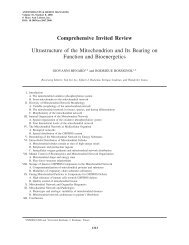MiPsummer Programme pdf - Mitochondrial Physiology Society
MiPsummer Programme pdf - Mitochondrial Physiology Society
MiPsummer Programme pdf - Mitochondrial Physiology Society
Create successful ePaper yourself
Turn your PDF publications into a flip-book with our unique Google optimized e-Paper software.
78<br />
Abstract # 46<br />
INSULIN SENSITIVITY BEFORE AND AFTER GASTRIC BYPASS IN TYPE 2<br />
DIABETES PATIENTS AND NORMAL GLUCOSE TOLERANCE SUBJECTS.<br />
Hansen M.¹, Lund M.¹², Helge J.W.¹, Dela F.¹<br />
1: University of Copenhagen, Denmark.<br />
2: Koege Hospital, Department of Surgery, Denmark.<br />
Introduction<br />
Gastric bypass surgery (GBP) is known to bring 75-80% of type 2 diabetes patients into remission<br />
shortly after their operation.<br />
We studied insulin sensitivity and body composition before and after GBP in morbidly obese<br />
patients with type 2 diabetes (DM2) and patients with normal glucose tolerance (NGT).<br />
The aim was to determine how insulin sensitivity is affected by uncontrolled weight loss before<br />
operation and resulting from GBP.<br />
Methods<br />
11 patients (7Female/4Male, 6NGT/5DM2) were recruited. Patients were studied 3 times: At<br />
baseline (A); after 10-12% weight loss by diet (before surgery) (B); and 4 months post surgery (C).<br />
Body composition was measured by Dual X-ray Energy Absorption (DXA) and peripheral insulin<br />
sensitivity by hyperinsulinemic (80mU/m²/min), euglycemic clamp.<br />
Results<br />
In the NGT there was no difference in GIR/FFM from A-B and B-C (p>0,05) and in spite of a<br />
weight loss (-27.5±2kg) from A-C, GIR/FFM did not increase (11.0±0.9 vs. 13.5±1.3<br />
mg/min/kgFFM (p=0.07)).<br />
In DM2 GIR/FFM did not change from A-B (4.5±0.5 vs. 6.4±1.0 mg/min/kgFFM (p>0.05)) but<br />
from B-C (6.4±1.0 vs. 9.2±0.9 mg/min/kgFFM (p=0.02)) and A-C (4.4±0.5 vs. 9.2±0.9<br />
mg/min/kgFFM (p=0.002)) GIR/FFM increased significantly.<br />
The size of weight loss in NGT vs. DM2 from A-B (5.7±1.0 vs. 5.2±1.0 kg) and B-C (21.8±1.0 vs.<br />
22.8±3.0 kg ) was similar (p>0.05).<br />
Conclusion<br />
GBP does not improve GIR/FFM in obese patients without DM2; most likely due to initially<br />
preserved insulin sensitivity.<br />
A minor (diet induced) weight loss does not improve GIR/FFM in DM2, while a more massive<br />
GBP induced weight loss improves peripheral insulin sensitivity.



